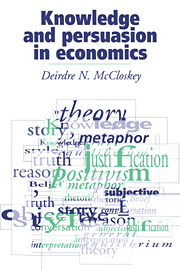Book contents
- Frontmatter
- Contents
- List of figures and tables
- Preface
- Acknowledgments
- Part I Exordium
- Part II Narration
- Part III Division
- Part IV Proof
- Part V Refutation
- 14 The very idea of epistemology
- 15 The tu quoque argument and the claims of rationalism
- 16 Armchair philosophy of economics
- 17 Philosophy of science without epistemology: the Popperians
- 18 Reactionary modernism: the Rosenberg
- 19 Methodologists of economics, big M and small
- 20 Getting “rhetoric”: Mark Blaug and the Eleatic Stranger
- 21 Anti-post-pre-metamodernism: the Coats/McPherson/Friedman
- 22 Splenetic rationalism, Austrian style
- 23 The economists of ideology: Heilbroner, Rossetti, and Mirowski
- 24 Rhetoric as morally radical
- Part VI Peroration
- List of works cited
- Index
18 - Reactionary modernism: the Rosenberg
Published online by Cambridge University Press: 01 February 2010
- Frontmatter
- Contents
- List of figures and tables
- Preface
- Acknowledgments
- Part I Exordium
- Part II Narration
- Part III Division
- Part IV Proof
- Part V Refutation
- 14 The very idea of epistemology
- 15 The tu quoque argument and the claims of rationalism
- 16 Armchair philosophy of economics
- 17 Philosophy of science without epistemology: the Popperians
- 18 Reactionary modernism: the Rosenberg
- 19 Methodologists of economics, big M and small
- 20 Getting “rhetoric”: Mark Blaug and the Eleatic Stranger
- 21 Anti-post-pre-metamodernism: the Coats/McPherson/Friedman
- 22 Splenetic rationalism, Austrian style
- 23 The economists of ideology: Heilbroner, Rossetti, and Mirowski
- 24 Rhetoric as morally radical
- Part VI Peroration
- List of works cited
- Index
Summary
Alexander Rosenberg's reaction to the new criticism of science, then, is merely one example of how the Popperian philosophers of science react to being disturbed in their armchairs. Rosenberg wrote a very long review of The Rhetoric of Economics, reprinting it with additions in his recent book (1992, pp. 31-55). Plato's dialogues were given by editors a title that mentioned the chief character, usually the one sparring with Socrates. In referring to them the custom is to speak of the Crito, the Phaedrus, or, the shortest of the dialogues, an early one in which Socrates converses with a reciter of Homer who believes himself to have all wisdom, the Ion:
Socrates: Welcome, Ion! And whence come you to pay a visit? From your home in California?
Ion: No, Socrates, I come from Chicago and the festival of philosophers of science there.
Socrates: What! Do the citizens of Chicago, in honoring the field, have a contest between philosophers of science, too? And did you compete?
Ion: Yes. I carried off the second prize in Reactionary Declamation.
Socrates: Well done! I envy you philosophers of science, who must be conversant with so many fine scientists. And you have to understand their thought, not merely learn their lines. All that, of course, will excite one's envy.
- Type
- Chapter
- Information
- Knowledge and Persuasion in Economics , pp. 247 - 264Publisher: Cambridge University PressPrint publication year: 1994



